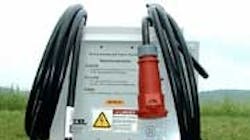NYSERDA awards $300K to New West Technologies
The New York State Energy Research and Development Authority (NYSERDA) has awarded $300,000 to New West Technologies (NWT) of Utica NY to demonstrate the cost and environmental savings of investing in equipment to support electric-powered refrigerator trucks.
An additional $171,000 toward the project will be provided by NWT, an engineering and management consulting company, and other project partners.
NWT will work with Hannaford Supermarkets and other retailers to install a network of plug-in connectors. The first installation will be at Hannaford’s distribution warehouse in Schodack. The purpose of this demonstration project is to encourage more widespread use of this technology, which is commonly used in Europe but has been slow to catch on in the United States.
Under this project, 460-volt electrical systems will be installed at two distribution centers and numerous retail outlets in New York. NWT expects to be working with a second retailer, not yet identified. Hannaford is the first to sign up for the project and is committing 15 electric standby plug-in trailers, out of a fleet of 50 the company already owns. NWT will work with Hannaford to identify New York store locations that could benefit economically from the electrical connections, where trailers remain onsite for extended periods.
Conventional trailer refrigeration units use a trailer-mounted diesel engine to power a refrigeration system for storing and transporting fresh and frozen foods. Electric-standby trailers instead use electricity to perform this function when parked at spaces equipped with the right connections. Electric operation is less costly than diesel, results in less greenhouse gas emissions and other pollution, and is quieter.
At a recent, six-month-long demonstration project in Rochester NY involving electric refrigerated trailers, three trailers saved almost 2,000 gallons of diesel by using the plug-in technology.
Under this project, NWT will design and demonstrate the installation of technology at the warehouse docks and in the parking lot (where trailers are staged before delivery) to support the electric plug-in trailers. The project also includes an evaluation of safety equipment to prevent the trailers from accidentally pulling away while still plugged into the charging infrastructure, and an analysis of the energy, environment, and noise reduction benefits.
The objective of this NYSERDA project is to facilitate a network where refrigerated trucks can operate solely on electricity for both loading and unloading of goods.
NWT, a Native American-owned small business, specializes in technical services related to efficiency, advanced transportation technologies, alternative fuels, and petroleum.
Hannaford, based in Scarborough ME, operates 178 stores in Maine, New York, Massachusetts, New Hampshire, and Vermont. The company has more than 26,000 employees.
